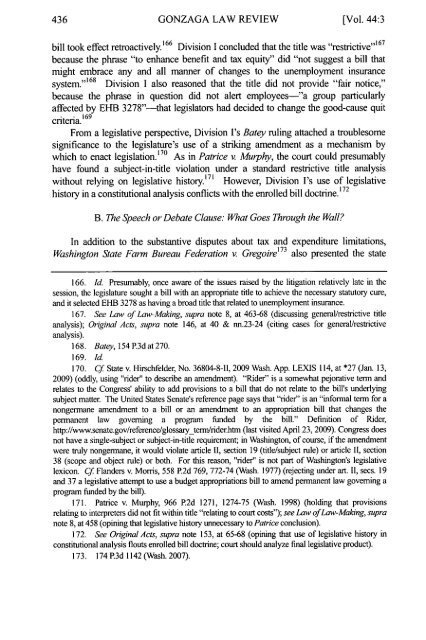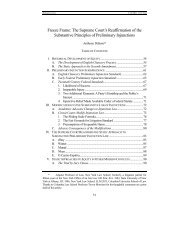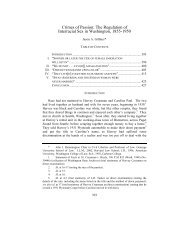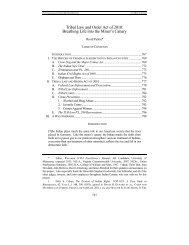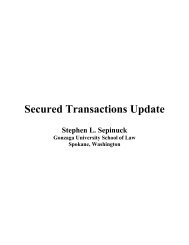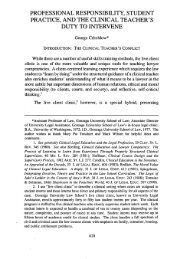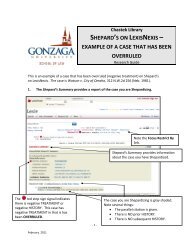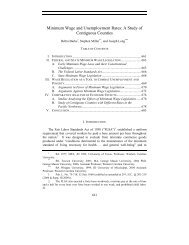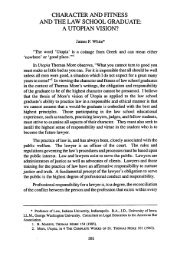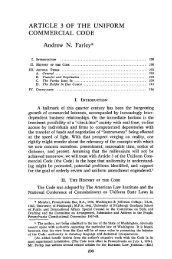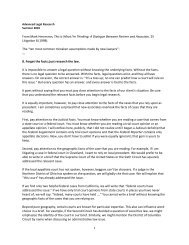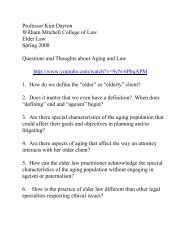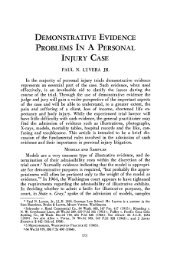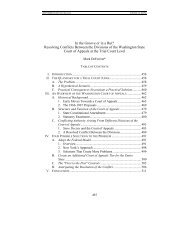I Developments in Washington's Law of Law-Making - Gonzaga ...
I Developments in Washington's Law of Law-Making - Gonzaga ...
I Developments in Washington's Law of Law-Making - Gonzaga ...
Create successful ePaper yourself
Turn your PDF publications into a flip-book with our unique Google optimized e-Paper software.
GONZAGA LAW REVIEW<br />
[Vol. 44:3<br />
bill took effect retroactively. 166 Division I concluded that the title was "restrictive ' 167<br />
because the phrase "to enhance benefit and tax equity" did "not suggest a bill that<br />
might embrace any and all manner <strong>of</strong> changes to the unemployment <strong>in</strong>surance<br />
system." ' 168 Division I also reasoned that the title did not provide "fair notice,"<br />
because the phrase <strong>in</strong> question did not alert employees-"a group particularly<br />
affected by EHB 3278"-that legislators had decided to change the good-cause quit<br />
criteria. 6 9<br />
From a legislative perspective, Division I's Batey rul<strong>in</strong>g attached a troublesome<br />
significance to the legislature's use <strong>of</strong> a strik<strong>in</strong>g amendment as a mechanism by<br />
which to enact legislation.' As <strong>in</strong> Patrice v. Murphy, the court could presumably<br />
have found a subject-<strong>in</strong>-title violation under a standard restrictive title analysis<br />
without rely<strong>in</strong>g on legislative history.' 7 1 However, Division I's use <strong>of</strong> legislative<br />
history <strong>in</strong> a constitutional analysis conflicts with the enrolled bill doctr<strong>in</strong>e.1 72<br />
B. The Speech or Debate Clause: What Goes Through the Wall?<br />
In addition to the substantive disputes about tax and expenditure limitations,<br />
Wash<strong>in</strong>gton State Farm Bureau Federation v. Gregoire 173 also presented the state<br />
166. Id. Presumably, once aware <strong>of</strong> the issues raised by the litigation relatively late <strong>in</strong> the<br />
session, the legislature sought a bill with an appropriate title to achieve the necessary statutory cure,<br />
and it selected EHB 3278 as hav<strong>in</strong>g a broad title that related to unemployment <strong>in</strong>surance.<br />
167. See <strong>Law</strong> <strong>of</strong> <strong>Law</strong>-Mak<strong>in</strong>g, supra note 8, at 463-68 (discuss<strong>in</strong>g general/restrictive title<br />
analysis); Orig<strong>in</strong>al Acts, supra note 146, at 40 & nn.23-24 (cit<strong>in</strong>g cases for general/restrictive<br />
analysis).<br />
168. Batey, 154 P.3d at270.<br />
169. Id.<br />
170. Cf State v. Hirschfelder, No. 36804-8-11, 2009 Wash. App. LEXIS 114, at *27 (Jan. 13,<br />
2009) (oddly, us<strong>in</strong>g "rider" to describe an amendment). "Rider" is a somewhat pejorative term and<br />
relates to the Congress' ability to add provisions to a bill that do not relate to the bill's underly<strong>in</strong>g<br />
subject matter. The United States Senate's reference page says that "rider" is an "<strong>in</strong>formal term for a<br />
nongermane amendment to a bill or an amendment to an appropriation bill that changes the<br />
permanent law govern<strong>in</strong>g a program funded by the bill." Def<strong>in</strong>ition <strong>of</strong> Rider,<br />
http://www.senate.gov/reference/glossaryterm/rider.htm (last visited April 23, 2009). Congress does<br />
not have a s<strong>in</strong>gle-subject or subject-<strong>in</strong>-title requirement; <strong>in</strong> Wash<strong>in</strong>gton, <strong>of</strong> course, if the amendment<br />
were truly nongermane, it would violate article II, section 19 (title/subject rule) or article 11, section<br />
38 (scope and object rule) or both. For this reason, "rider" is not part <strong>of</strong> Wash<strong>in</strong>gton's legislative<br />
lexicon. Cf Flanders v. Morris, 558 P.2d 769, 772-74 (Wash. 1977) (reject<strong>in</strong>g under art. I1, secs. 19<br />
and 37 a legislative attempt to use a budget appropriations bill to amend permanent law govern<strong>in</strong>g a<br />
program funded by the bill).<br />
171. Patrice v. Murphy, 966 P.2d 1271, 1274-75 (Wash. 1998) (hold<strong>in</strong>g that provisions<br />
relat<strong>in</strong>g to <strong>in</strong>terpreters did not fit with<strong>in</strong> title "relat<strong>in</strong>g to court costs"); see <strong>Law</strong> <strong>of</strong> <strong>Law</strong>-Mak<strong>in</strong>g, supra<br />
note 8, at 458 (op<strong>in</strong><strong>in</strong>g that legislative history unnecessary to Patrice conclusion).<br />
172. See Orig<strong>in</strong>al Acts, supra note 153, at 65-68 (op<strong>in</strong><strong>in</strong>g that use <strong>of</strong> legislative history <strong>in</strong><br />
constitutional analysis flouts enrolled bill doctr<strong>in</strong>e; court should analyze f<strong>in</strong>al legislative product).<br />
173. 174 P.3d 1142 (Wash. 2007).


